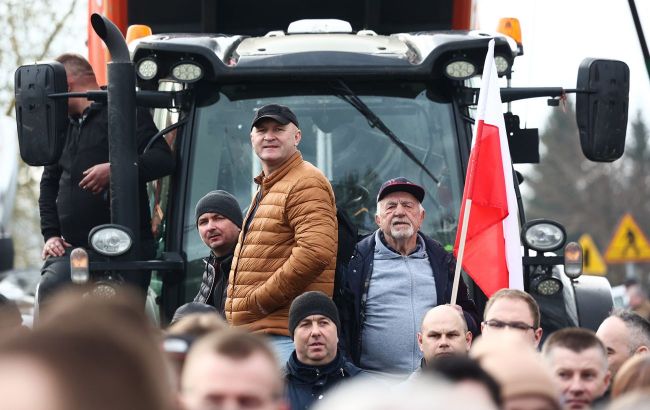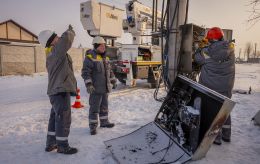Key developments at Polish-Ukrainian border before possible total blockade
 Polish farmers are currently blocking six border crossing points with Ukraine (Photo: Getty Images)
Polish farmers are currently blocking six border crossing points with Ukraine (Photo: Getty Images)
On the Polish side of the border with Ukraine, six crossing points remain blocked today, with nearly 3,000 trucks waiting in queues. Protesters promise a total blockade tomorrow, while the Ukrainian side is already preparing a response action.
Read below in the material from RBC-Ukraine about what is happening at the Ukraine-Poland border and how it is commented on from both sides.
Statements from the spokesperson of the State Border Guard Service Andriy Demchenko, Minister of Infrastructure Oleksandr Kubrakov, the press service of the Ministry of Infrastructure, Ukrzaliznytsia, Ukrinform, Polish media, and the State Customs Service were used during the preparation of the material.
As of today, February 19th, six border crossing points remain blocked on the border with Poland: Yahodyn, Ustyluh, Uhryniv, Rava-Ruska, Shehyni, and Krakovets.
On all these routes, there are approximately 2900 trucks queued up, waiting for the opportunity to cross the border into our country. The largest queues are at Yahodyn and Krakovets.
Additionally, yesterday and for part of Saturday, trucks were not allowed to pass through in both directions at the Yahodyn checkpoint. However, this morning, the Polish side announced that passage would resume, according to Andriy Demchenko, spokesperson for the State Border Guard Service of Ukraine.
Total blockade: What the Poles promise and how Ukraine reacts
Polish agrarians announced that on February 20th, they would block all border crossings with Ukraine, as well as access roads to railway junctions and seaports.
"The blockades will affect not only border crossings but also transportation hubs, access roads to railway junctions, and seaports," the initiators of the agricultural protest said, as quoted by Polish radio RMF FM.
However, Ukrainian border guards have not received information from their Polish counterparts about a complete border blockade tomorrow.
"We have not received information from Polish border guards that other routes will be blocked. However, it should be noted that there are 9 routes on the border with Poland, 6 of which are currently blocked or where traffic is significantly hindered for trucks. Moreover, among these six, 4 are the largest crossing points for trucks weighing over 7.5 tons," Demchenko explained.
He further clarified that the remaining three routes have their peculiarities, as some may be used by empty trucks weighing over 7.5 tons, while others are for smaller trucks in both directions.
Do the strikers allow buses and cars to pass?
On Sunday, February 18th, videos started circulating online claiming that protesters were not allowing even passenger buses to pass. This prompted the Minister for Communities, Territories and Infrastructure Development of Ukraine, Oleksandr Kubrakov, to urgently negotiate with the head of Poland's National Security Bureau, Jacek Siewiera, emphasizing the inadmissibility of blocking the border, especially for passenger transport.
Kubrakov emphasized that blocking the border is a "direct threat to the security of the defending country."
"We expect specific actions from our Polish colleagues to prevent such situations and resolve the problem as a whole," Kubrakov stated.
Deputy Minister Serhiy Derkach is also in contact with his Polish counterpart, highlighting that despite the suspension of the blockade by Polish carriers, the situation at the border is becoming even more critical.
"Six border crossing points on the Polish side are blocked. The most critical situation is at the Yahodyn-Dorohusk checkpoint, where the movement of cargo vehicles has completely stopped. Humanitarian aid, perishable goods, and fuel are not being allowed through. This directly affects our defense capability," Derkach noted.
However, Ukrainian border guards later clarified that they had no information that the Poles were blocking the movement of passenger cars and buses.
"Of course, we paid attention to the videos that appeared in the public domain claiming that they were obstructing the movement of buses. But most likely, due to their presence on roads leading to the border, which are used to circumvent the concentration of Polish farmers, they simply complicate the movement for certain categories of vehicles, precisely to bypass areas where Polish farmers are gathered. But I will emphasize once again that the movement of buses, in particular, is happening in both directions," Demchenko explained.
What's happening with the railway?
Yesterday, the State Customs Service of Ukraine reported that protesters attempted to block the railway tracks at the Dorohusk station from 15:30 to 17:30. However, the Polish police prevented this.
The following day, Ukrainian Railways (Ukrzaliznytsia) reported on the blocking of passenger train No. 119 Kyiv-Helm. The train was carrying 260 passengers, the vast majority of whom were women and children. Many passengers had further connections and flights. After intervention by the Polish police and railway workers, the train was unblocked, and it continued its journey.
As of today, according to Ukrainian Railways, railway connections with Poland are operating normally, and trains are running without complications.
Ukrainian carriers are preparing a protest action in response to the blocking by Polish farmers
On Tuesday, February 20, Ukrainian carriers will start a peaceful protest at certain border crossings with Poland. The head of the International Car Carriers of Ukraine, Volodymyr Mykhailovych, announced this to Ukrinform media.
According to him, the peaceful action will start tomorrow at 12:00 simultaneously at three international road border crossings: Rava-Ruska, Krakovets, and Shehyni. Participants will ensure control and order of passage through these checkpoints, not allowing Polish trucks to bypass the general queue of trucks.
It is expected that the action will last around the clock until March 15, 2024, or until the Polish protesters unblock the borders.
Boycott in response - is Ukraine considering such a scenario?
Minister for Infrastructure Oleksandr Kubrakov commented that calls for a boycott of Polish products are not the most appropriate strategy for solving the problem.
"At the beginning of the full-scale war, Polish citizens and the government provided shelter to millions of our citizens. Poland helped work out military logistics, and extended a helping hand when the fuel crisis began," Kubrakov reminded.
He expressed confidence that the number of positive cooperation stories outweighs the problem with border blockades.
"The enemy only hopes that Ukraine will start quarreling with its neighbors and partners. Therefore, it is worth not stopping the dialogue and seeking alternative solutions, rather than playing into Russia's hands and creating even more problems," the minister believes.
Background
In November of last year, Polish carriers began protests on the border with Ukraine, demanding the return of the permit system for Ukrainian carriers and the cancellation of the customs visa-free regime between the EU and Ukraine.
However, at the beginning of December, Kyiv and Warsaw agreed to conditions to unblock the border for truck traffic. Already on January 6 of this year, the Polish government signed an agreement with farmers to end the border blockade, and on January 16, the Poles completely lifted the blockade of the border with Ukraine. However, the blockade of the Ukrainian border as a "way to solve internal problems" for Polish farmers persisted.
On February 9, the Polish side renewed the blockade. This time, Polish farmers began protests both on the roads of the country and at border crossings with Ukraine. This action is expected to last 30 days (until March 9) or until the "problem is resolved."
However, the situation is currently more acute than it was in the fall. Whereas previously, Polish carriers and farmers simply blocked the passage of Ukrainian trucks with goods across the border, a week ago they resorted to more radical actions. Thus, on February 11, in the area of the Dorohusk border crossing on Polish territory, protesters damaged several trucks. As a result, grain being transported in transit spilled directly onto the road. RBC-Ukraine wrote in detail about this incident.
More details about what dissatisfies the farmers, how their discontent is related to Ukraine, and why Kyiv has not yet managed to solve trade problems can be found in a separate material.

